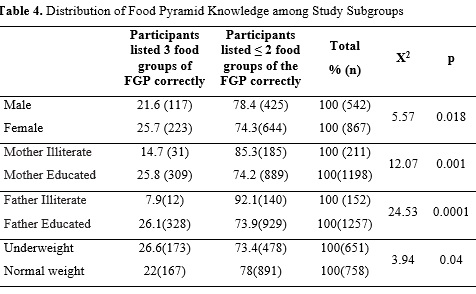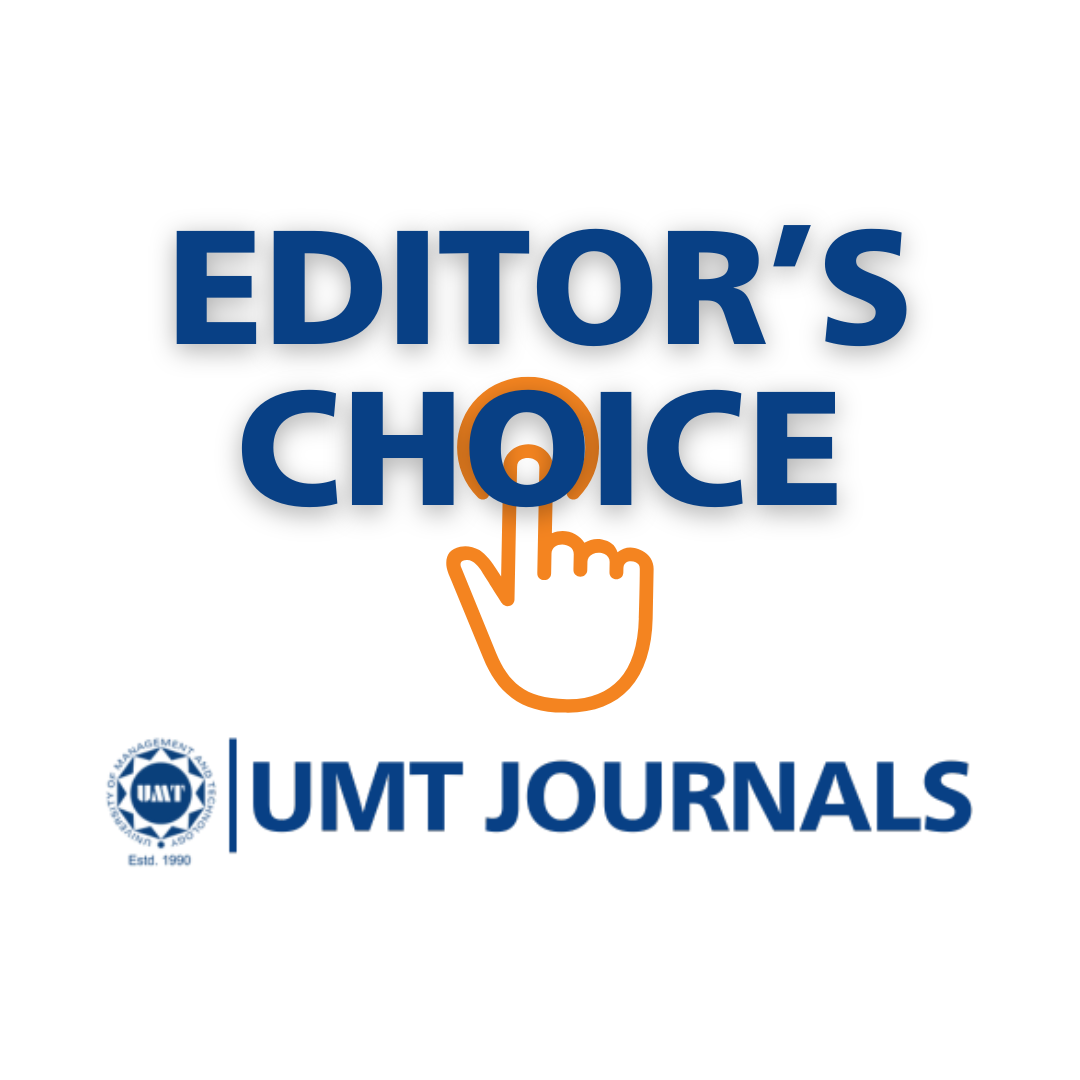Assessment of Eating Behaviors and Nutritional Status of Adolescents: A School-based Cross-Sectional Study Conducted in Lahore, Pakistan
Abstract
 Abstract Views: 118
Abstract Views: 118
Healthy eating patterns, if adopted early in life, support the growth, learning ability, and overall health of children and adolescents. The latter are more vulnerable to nutritional deficiencies due to their inappropriate food choices, peer pressure, unhealthy eating habits, and increased nutritional demand. The current study aimed to determine the degree of compliance of adolescents to the recommended dietary guidelines. A multi stage stratified cluster sampling design was used to conduct qualitative research during the period January August 2019. The study population comprised the students of public and private high schools in Lahore, Punjab, Pakistan. A semi-structured questionnaire that focused on the general dietary intake and physical activity patterns in school setting was filled by interview technique. The determinants of eating behaviors were investigated using descriptive statistics and chi-square. As per the BMI percentiles, 46.2% (651) were underweight, 2.3% (33) were obese, and 6.2% (88) were overweight. The data indicated that the eating behaviors of participants did not follow the recommendations of the Food Guide Pyramid (FGP). However, on a scale of 1-10, it was found that family and advertisements have the highest impact on the food choices of adolescents with the scores of 6.5±2.69 and 6.1±2.77, respectively. The study concluded that adolescents in Lahore do not follow a healthy eating pattern. Nutritional education and interventions must be prioritized to promote healthy eating habits among adolescents.
Downloads
References
Unicef. The state of the world's children 2011: adolescence - an age of opportunity. Unicef. https://data.unicef.org/resources/the-state-of-the-worlds-children-2011-adolescents-an-age-of-opportunity/. 2011.
Moreno LA, Rodríguez G, Fleta J, Bueno-Lozano M, Lázaro A, Bueno G. Trends of dietary habits in adolescents. Crit Rev Food Sci Nutr. 2010;50(2):106-112. https://doi.org/10.1080/10408390903467480
Van Cauwenberghe E, Maes L, Spittaels H, et al. Effectiveness of school-based interventions in Europe to promote healthy nutrition in children and adolescents: systematic review of published and ‘grey’literature. Br J Nutr. 2010;103(6):781-797. https://doi.org/10.1017/S0007114509993370
IFPRI. Global food policy report. IFPRI. https://www.ifpri.org/publication/2017-global-food-policy-report. 2017.
WHO. Obesity and overweight fact sheet. WHO. https://www.who.int/news-room/fact-sheets/detail/obesity-and-overweight#:~:text=Facts%20about%20overweight%20and%20obesity&text=In%202016%2C%2039%25%20of%20adults,tripled%20between%201975%20and%202016. 2021.
Abudayya AH, Stigum H, Shi Z, Abed Y, Holmboe-Ottesen G. Sociodemographic correlates of food habits among school adolescents (12–15 year) in North Gaza Strip. BMC Public Health. 2009;9(1):1-13. https://doi.org/10.1186/1471-2458-9-185
Larson NI, Neumark-Sztainer D, Hannan PJ, Story M. Family meals during adolescence are associated with higher diet quality and healthful meal patterns during young adulthood. J Acad Nutr Diet. 2007;107(9):1502-1510. https://doi.org/10.1016/j.jada.2007.06.012
Schmidt AB, Lund M, Corn G, et al. Dietary glycemic index and glycemic load during pregnancy and offspring risk of congenital heart defects: a prospective cohort study. Am J Clin Nutr. 2020;111(3):526-535. https://doi.org/10.1093/ajcn/nqz342
Fanzo J, Hawkes C, Udomkesmalee E, et al. 2018 global nutrition report. City University of London. https://openaccess.city.ac.uk/id/eprint/22797/. 2018.
Anik AI, Rahman MM, Rahman MM, Tareque MI, Khan MN, Alam MM. Double burden of malnutrition at household level: A comparative study among Bangladesh, Nepal, Pakistan, and Myanmar. PloS one. 2019;14(8):e0221274. https://doi.org/10.1371/journal.pone.0221274
Rifat-uz-Zaman ZI, Ali U. Dietary intakes of urban adolescents of Sialkot, Pakistan do not meet the standards of adequacy. Pak J Nutr 2013;12:460-467.
Mushtaq MU, Gull S, Abdullah HM, Shahid U, Shad MA, Akram J. Prevalence and socioeconomic correlates of overweight and obesity among Pakistani primary school children. BMC Public Health. 2011;11(1):724. https://doi.org/10.1186/1471-2458-11-724
Welsh S, Davis C, Shaw A. Development of the food guide pyramid. Nutrition Today. 1992;27(6):12-23.
USDA. Dietary guidelines for Americans 2015-2020. USDA. https://health.gov/sites/default/files/2019-09/2015-2020_Dietary_Guidelines.pdf. 2015.
Akman M, Akan H, İzbirak G, et al. Eating patterns of Turkish adolescents: a cross-sectional survey. J Nutr. 2010;9(1):e67. https://doi.org/10.1186/1475-2891-9-67
Bede F, Cumber SN, Nkfusai CN, et al. Dietary habits and nutritional status of medical school students: the case of three state universities in Cameroon. Pan Afr Med J. 2020;35:15. https://doi.org/0.11604/pamj.2020.35.15.18818
Murimi M, Chrisman M, McCollum H, Mcdonald O. A qualitative study on factors that influence students’ food choices. J Nutr Health. 2016;2(1):e6.
Ogden CL, Kuczmarski RJ, Flegal KM, et al. Centers for disease control and prevention 2000 growth charts for the United States: Improvements to the 1977 national center for health statistics version. Pediatrics. 2002;109(1):45-60.
Lindenmayer GW, Stoltzfus RJ, Prendergast AJ. Interactions between zinc deficiency and environmental enteropathy in developing countries. Adv Nutr. 2014;5(1):1-6. https://doi.org/10.3945/an.113.004838
Chandra RK. Nutrition and the immune system: an introduction. Am J Clin Nutr. 1997;66(2):460S-463S. https://doi.org/10.1093/ajcn/66.2.460S
Bauer J, Jürgens H, Frühwald MC. Important aspects of nutrition in children with cancer. Adv Nutr. 2011;2(2):67-77. https://doi.org/10.3945/an.110.000141
Munoz KA, Krebs-Smith SM, Ballard-Barbash R, Cleveland LE. Food intakes of US children and adolescents compared with recommendations. Pediatrics. 1997;100(3):323-329. https://doi.org/10.1542/peds.100.3.323
Sebastian RS, Enns CW, Goldman JD. US adolescents and MyPyramid: associations between fast-food consumption and lower likelihood of meeting recommendations. J Am Diet Assoc. 2009;109(2):226-235. https://doi.org/10.1016/j.jada.2008.10.053
Garipağaoğlu M, Sahip Y, Budak N, Akdikmen Ö, Altan T, Baban M. Food types in the diet and the nutrient intake of obese and non− obese children. J Clin Res Pediatr Endocrinol. 2008;1(1):21-29. https://doi.org/10.4008/jcrpe.v1i1.5
Arcan C, Neumark-Sztainer D, Hannan P, van den Berg P, Story M, Larson N. Parental eating behaviours, home food environment and adolescent intakes of fruits, vegetables and dairy foods: longitudinal findings from Project EAT. Public Health Nutr. 2007;10(11):1257-1265. https://doi.org/10.1017/S1368980007687151
Vadiveloo M, Zhu L, Quatromoni PA. Diet and physical activity patterns of school-aged children. J Am Diet Assoc. 2009;109(1):145-151. https://doi.org/10.1016/j.jada.2008.10.012
Elbel B, Gyamfi J, Kersh R. Child and adolescent fast-food choice and the influence of calorie labeling: A natural experiment. Int J Obes. 2011;35(4):493-500. https://doi.org/10.1038/ijo.2011.4
Andreyeva T, Kelly IR, Harris JL. Exposure to food advertising on television: Associations with children's fast food and soft drink consumption and obesity. Econ Hum Biol. 2011;9(3):221-233. https://doi.org/10.1016/j.ehb.2011.02.004
Shaw ME. Adolescent breakfast skipping: An Australian study. Adolescence. 1998;33(132):851-862.
Giovannini M, Verduci E, Scaglioni S, et al. Breakfast: a good habit, not a repetitive custom. Int J Med Res. 2008;36(4):613-624. https://doi.org/10.1177/147323000803600401
Savige G, MacFarlane A, Ball K, Worsley A, Crawford D. Snacking behaviours of adolescents and their association with skipping meals. Int J Behav Nutr Phys Act. 2007;4(1):e36. https://doi.org/10.1186/1479-5868-4-36
Deshmukh-Taskar PR, Nicklas TA, O'Neil CE, Keast DR, Radcliffe JD, Cho S. The relationship of breakfast skipping and type of breakfast consumption with nutrient intake and weight status in children and adolescents: The national health and nutrition examination survey 1999-2006. J Am Diet Assoc. 2010;110(6):869-878. https://doi.org/10.1016/j.jada.2010.03.023
DeJong CS, van Lenthe FJ, van der Horst K, Oenema A. Environmental and cognitive correlates of adolescent breakfast consumption. Prev Med. 2009;48(4):372-377. https://doi.org/10.1016/j.ypmed.2009.02.009
Hammons AJ, Fiese BH. Is frequency of shared family meals related to the nutritional health of children and adolescents? Pediatrics. 2011;127(6):e1565-e1574. https://doi.org/10.1542/peds.2010-1440
Mota J, Fidalgo F, Silva R, et al. Relationships between physical activity, obesity and meal frequency in adolescents. Ann Hum Biol. 2008;35(1):1-10. https://doi.org/10.1080/03014460701779617
Neumark-Sztainer D, Larson NI, Fulkerson JA, Eisenberg ME, Story M. Family meals and adolescents: what have we learned from Project EAT (Eating Among Teens)? Public Health Nutr. 2010;13(7):1113-1121. https://doi.org/10.1017/S1368980010000169
Larson NI, Story M, Eisenberg ME, Neumark-Sztainer D. Food preparation and purchasing roles among adolescents: associations with sociodemographic characteristics and diet quality. J Acad Nutr Diet. 2006;106(2):211-218. https://doi.org/10.1016/j.jada.2005.10.029
Janssen I, LeBlanc AG. Systematic review of the health benefits of physical activity and fitness in school-aged children and youth. Int J Behav Nutr Phys Act. 2010;7(1):40. https://doi.org/10.1186/1479-5868-7-40
Hills AP, King NA, Armstrong TP. The contribution of physical activity and sedentary behaviours to the growth and development of children and adolescents. Sports Med. 2007;37(6):533-545. https://doi.org/10.2165/00007256-200737060-00006
Butt J, Weinberg RS, Breckon JD, Claytor RP. Adolescent physical activity participation and motivational determinants across gender, age, and race. J Phys Act Health. 2011;8(8):1074-1083. https://doi.org/10.1123/jpah.8.8.1074
Bar-On ME, Broughton DD, Buttross S, et al. Children, adolescents, and television. Pediatrics. 2001;107(2):423-426. https://doi.org/10.1542/peds.107.2.423
Harper B, Tiggemann M. The effect of thin ideal media images on women’s self-objectification, mood, and body image. Sex Roles. 2008;58(9-10):649-657. https://doi.org/10.1007/s11199-007-9379-x
Grossbard JR, Lee CM, Neighbors C, Larimer ME. Body image concerns and contingent self-esteem in male and female college students. Sex Roles. 2009;60(3-4):198-207. https://doi.org/10.1007/s11199-008-9535-y
Taechangam S, Pinitchun U, Pachotikarn C. Development of nutrition education tool: healthy eating index in Thailand. Asia Pac J Clin Nutr. 2008;17(S1):365-367.
Freeland-Graves JH, Nitzke S. Position of the academy of nutrition and dietetics: total diet approach to healthy eating. J Acad Nutr Diet. 2013;113(2):307-317. https://doi.org/10.1016/j.jand.2012.12.013

Copyright (c) 2022 Ayesha Amjad, Azmat Ullah Khan, Savaiba Khattak, Saira Khalid, Arooj Abid

This work is licensed under a Creative Commons Attribution 4.0 International License.
BSR follows an open-access publishing policy and full text of all published articles is available free, immediately upon publication of an issue. The journal’s contents are published and distributed under the terms of the Creative Commons Attribution 4.0 International (CC-BY 4.0) license. Thus, the work submitted to the journal implies that it is original, unpublished work of the authors (neither published previously nor accepted/under consideration for publication elsewhere). On acceptance of a manuscript for publication, a corresponding author on the behalf of all co-authors of the manuscript will sign and submit a completed the Copyright and Author Consent Form.










